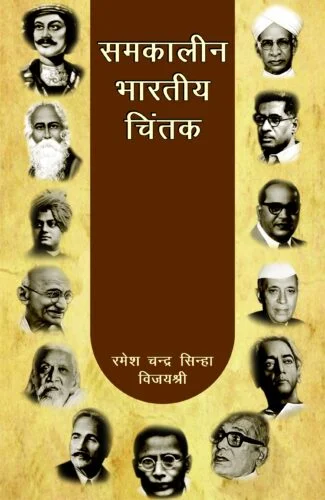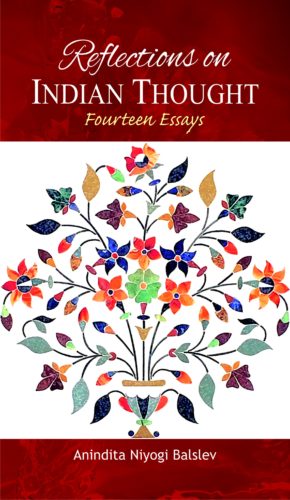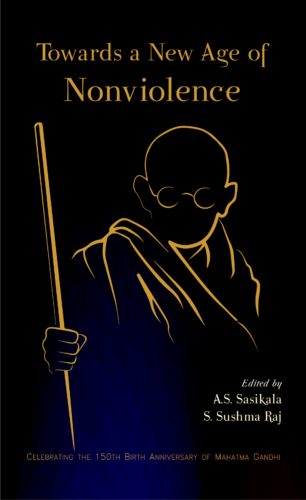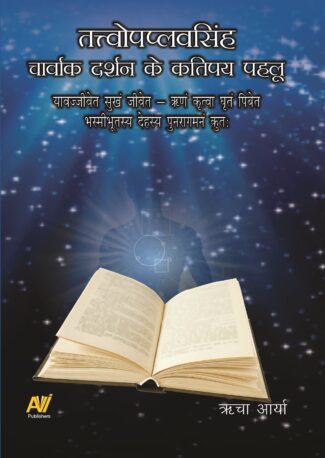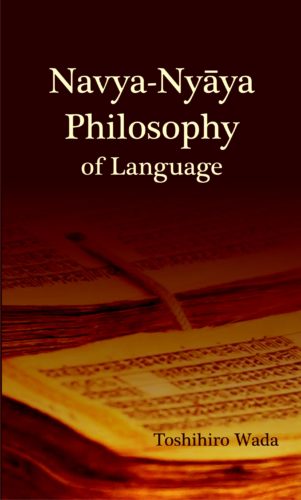

Samkaleen Bharatiya ...
Samkaleen Bharatiya Chintak (PB)
by: Ramesh Chandra Sinha , VijayshreePhiolosophical thoughts of modern Indian thinkers are quite comprehensive. While they are conversant with the Vedas, Upanisads and the Quran, they are also quite known to the Western thoughts. Philosophical thoughts of Raja Rammohun Roy, Tagore, Vivekananda, Mahatma Gandhi, Sri Aurobindo, Iqbal, K.C. Bhattacharya, S. Radhakrishnan, M.N. Roy, Ambedkar, Jawaharlal Nehru, J. Krishnamurty and Loknayak Jayaprakash Narain are streamlined and discussed.
Original price was: ₹395.00.₹355.00Current price is: ₹355.00.
ISBN: 9788124606612
Year Of Publication: 2013
Edition: 1st
Pages : xxiv, 424
Bibliographic Details : Bibliography
Language : Hindi
Binding : Paperback
Publisher: D.K. Printworld Pvt. Ltd.
Size: 23
Weight: 800
This is the age of enlightenment. The contemporary Indian thinkers accept and practise the old values, traditions, and have paved the way for a new thought process in philosophy. And this philosophy is the product of an age of India’s struggle against long and suppressive foreign rule, hampering the growth of our thought system. However, one could see a new synergy in post- independent India a philosophical renaissance. In such a background, these thinkers propose positive, synthetic and integral world-views.
The thoughts of contemporary thinkers are quite comprehensive and exhaustive because they are well aware of the Vedas, Upanishads and the Quran. On the other hand, modern Indian philosophers have reconciled between the Western and Eastern, and the ancient and modern thoughts. This volume streamlines the thoughts of Rammohun Roy, Rabindra Nath Tagore, Vivekananda, Mahatma Gandhi, Sri Aurobindo, Iqbal, K.C. Bhattacharya, Sarvepalli Radhakrishnan, M.N. Roy, Bhim Rao Ambedkar, Pandit Jawaharlal Nehru, and J. Krishnamurty.
It makes this book a good reading for the teachers and students of modern Indian philosophy, detailing the philosophical perspectives of popular modern Indian philosophers.
Fourth edition of Preface
Introduction
Foreword
1. The Nature and Meaning of Contemporary Indian Thought
The Concept of Contemporary Indian Philosophy
2. Raja Rammohun Roy
The Impact of Different Religions on Rammohun Roy Thoughts
God, World and Man
The Concept of World
The Concept of Man
Contribution to Philosophy
Perception
Reason
Testimony
Common Sense
Conclusion
3. Rabindranath Tagore
Tagore and Brahmo-Samaj
Tagore and Christianity
Tagore and Vaishnavism
The Conception of Absolute
God and World Þ Its Status
The Problem of Evil
The Finite-Infinite Nature of Human Self
Bondage and Liberation
Religion of Man
4. Vivekananda
Vivekanandas Neo-Vedantism
Universal Religion
Vivekanandas Philosophy of Religion
Four Kinds of Yoga
5. Mahatma Gandhi
Influence on Gandhi
Gandhi and Christianity
Mahatma Gandhi and Tolstoy
Mahatma Gandhi and Buddhism
Mahatma Gandhi and Bhagavad Gita
Gandhi and Islam
God
Proofs for the Existence of God
God and Inauspicious
Religion and Morality
Cardinal Virtues
Satyàgraha
Requirements of Satyàgrahã
Kinds of Satyàgraha
Sarvodaya
Sarvodaya and Marxism
The Place of Religion in Gandhian Philosophy
Relevance of Gandhian Thought in Contemporary Society
6. Sri Aurobindo
Saccidananda
The Concept of Supermind
Supermind as Truth-Consciousness or Real Idea
The Supermind as Creator
The World Process
Stages of Descent or Involution
The Process of Evolution: The Triple Character
Integral Yoga
The Nature of Integral Yoga
The Concept of Ignorance
Philosophy of Rebirth and the Law of Karma
Gnostic Being
7. Iqbal
Zallaludin Rumi and Iqbal
Bergson and Iqbal
Iqbal and Nietzsche
The Concept of Self
Destiny of Man
Nature of Intuition
Love and Reason
The Concept of World
The Concept of God
Space and Time
8. Krishnachandra Bhattacharyya
The Concept of Philosophy
Grades of Theoretic Consciousness
Interrelation of Subject and Object
The Subjects Gradual Realization of Freedom
Bodily Subjectivity
Psychical Subjectivity
Spiritual Subjectivity
9. Sarvepalli Radhakrishnan
Intellect and Intuition
Intuition
The Role of Reason and Intuition in Science, Art, Ethics and Religion
Mans Destiny
Law of Karma and Freedom
Radhakrishnans Views on Mans Destiny
Radhakrishnans Views on World
Radhakrishnans Conception of God
10. M.N. Rai
Modern Materialism
The Crisis of Materialism
Philosophy of Neo-humanism
11. Bhimrao Ambedakar
Social Strueture and Caste System
Annihilation of Caste
Religious Conversion
Neo-Buddhism and Subaltern Morality
Subaltern Morality and Social Justice
12. Jawaharlal Nehru
Marx and Nehru
Religion and Science
Scientific Humanism
Panchsheel and Non-alignment
Conclusion
13. J. Krishnamurti
Man, Nature and Reality
The Problem of Suffering
Immortality of Man
14. Jayaprakash Narayan
Karl Marx and Jayaprakash
Critique of Marxism
Social Philosophy of Jayaprakash
From Sarvodya till Sampoorn Kranti
Total Revolution
15. Critical Appraisal and Conclusion
Bibliography


